Bloom Consulting carried out two global and independent studies on the impact of the Covid-19 pandemic on Nation Brands together with sister company D2-Analytics.
This article covers the highlights from the first report which was presented by Bloom Consulting’s CEO, Jose Filipe Torres, during the City Nation Place webinar on May 27, 2020. The webinar was also attended by Rebecca Smith, Director of New Zealand Story, and by Niall Gibbons, CEO of Tourism Ireland. This study aims to better understand the impact of Covid-19 on Nation Brands and on all the dimensions of the Bloom Consulting Brand Wheel©, as well as understanding how crisis management by governments has affected perceptions and brands themselves.
The second report focuses on the impact of the coronavirus on tourist behaviours, as tourism was one of the most affected dimensions. The objective of this study is to understand the changes in the perceptions of tourists, the new trends in the sector and how the brands can recover through research and the collection of data and information. You can also check its highlights here.
Conclusions of the study on the impact on Nation Brands
The pandemic has had a profound effect on institutions, from the World Health Organisation itself, to national and regional governments and even the private sector. In the past few months, the international press has compared the ways in which Countries have been managing the Covid-19 pandemic. From the progression of the disease to the public response, or even the behaviour of citizens, this crisis has put Countries to the test with them being at the centre of the attentive and vigilant world public opinion.
In general, public and private entities are meeting the expectations of citizens who were positive about the way they have been facing the crisis. However, the study found that 68% of participants said that the crisis is shaping their perceptions of Countries, for better or for worse.
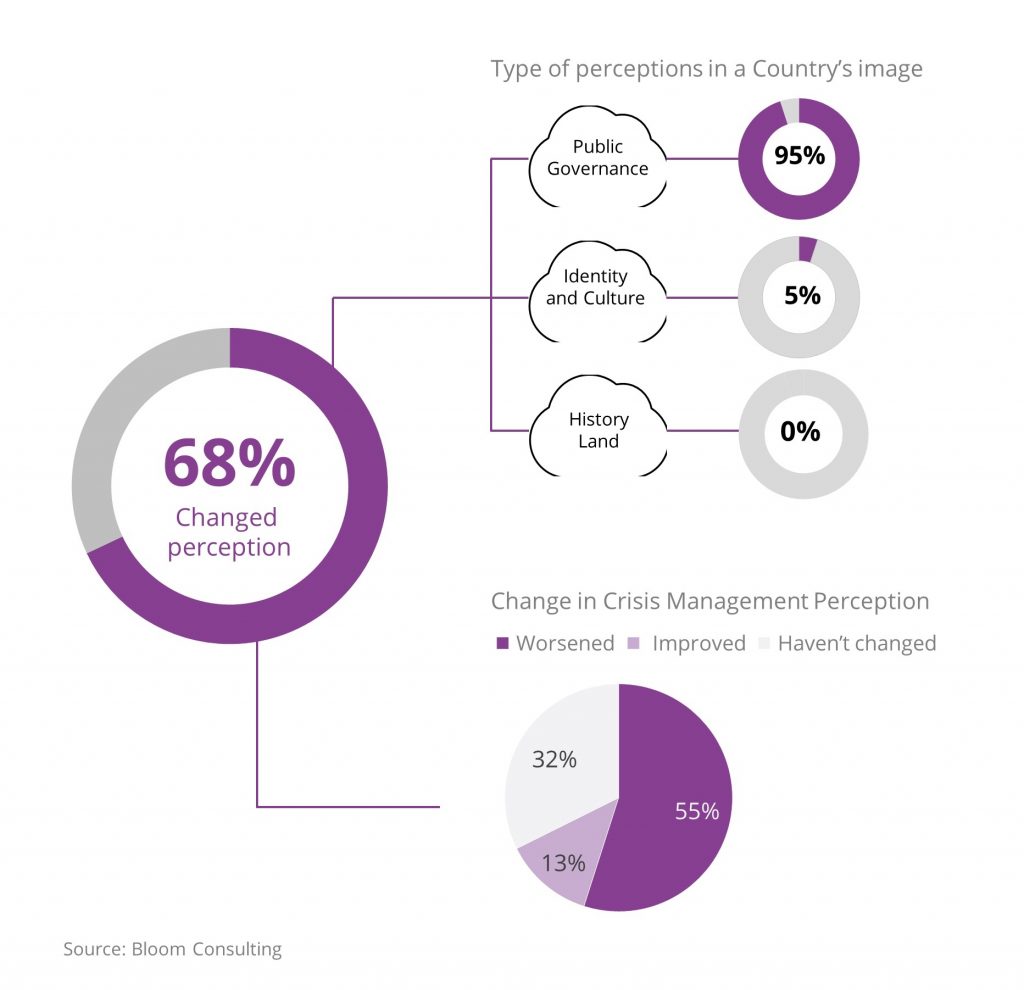
When we talk of Nation Brands, we must take into consideration the various perceptions that make up a Countries’ image in people’s minds: the way in which governments manage the Country, the Identity and Culture of the Country as well as its History and Territory. Over time the combination of these perceptions builds an image related to the Nation Brand which results in an emotion. This emotion will, in turn, have an impact on the citizen’s willingness to live, study, work, visit, invest, and buy in that Country.
As can be seen in the image, citizens tend to view the crisis through two lenses: Public Governance (95%) and Identity and Culture (5%). In other words, the change in perceptions is related to the response time and the effectiveness of government actions: 55% of global citizens say that the crisis management has negatively affected the Country’s image, against 13% who believe that the way the Country managed the crisis has improved its reputation. One third of participants (32%) believe that their perception has not changed.
However, this is only temporary as, generally, Nation Brands are only affected by crises when they are intense and prolonged and have an impact on the Identity and Culture of the Country.
In order to understand how global citizens view national responses to the crisis we asked respondents to indicate which Countries they considered to be coping better and worse with the Covid-19 outbreak. In general terms, there was a marked difference in perceptions regarding crisis management with Asia having more positive responses and the West with more negative responses.
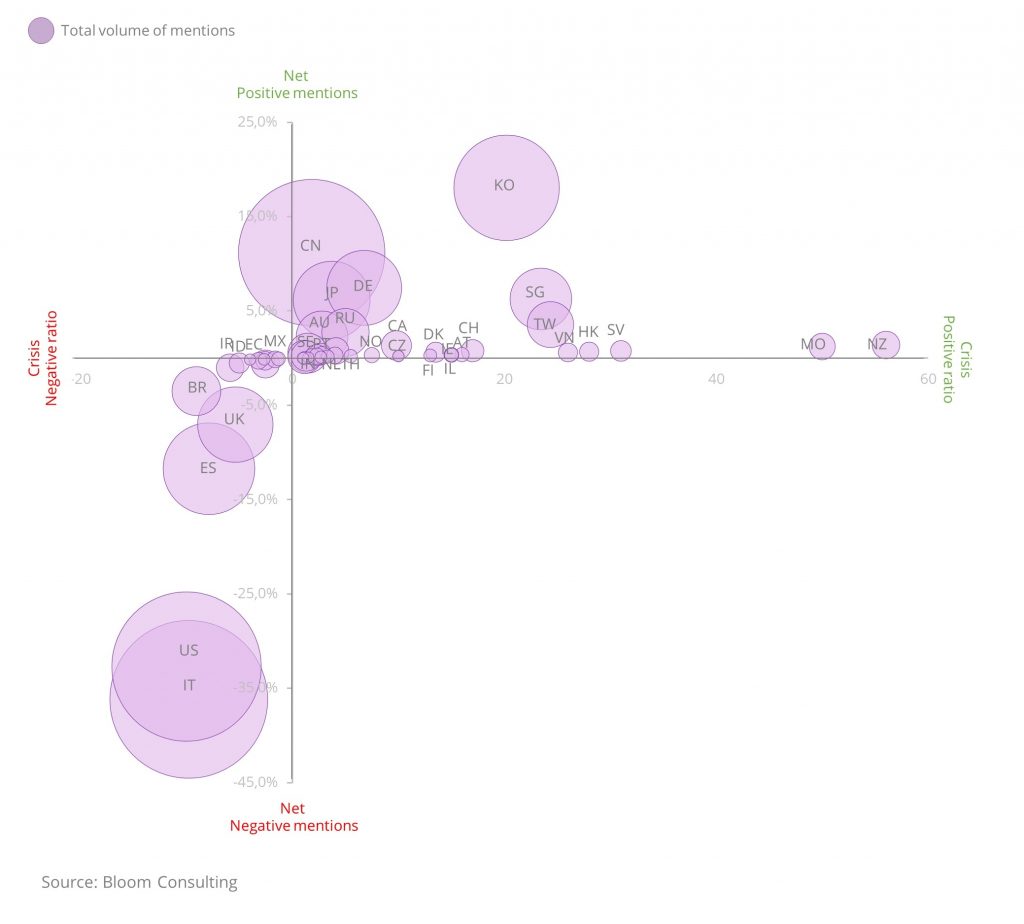
In order to analyse the ratio of positive to negative mentions of the brands, a matrix with two axes was created: the X axis refers to the perceptions and the Y axis to the volume of the same. When crossing these variables, the positioning of more than 140 Countries that were mentioned in the study were identified. The further to the right the Nation Brand is placed in the matrix the more positive the perceptions are and the further to the left the worse they are.
According to the chart above, New Zealand and Macao had the best rates of crisis management despite the low volume of mentions. South Korea had one of the highest volumes of net positive mentions with a 20:1 ratio to negative opinions. On the other hand, the United States and Italy recorded a negative crisis management rate with a high level of mentions (1:10). It should be noted that most Countries are close to the intersection of the X-Y axis with the example of China showing a polarised opinion regarding its performance.
However, these indicators are inaccurate when it is intended to understand the extent to which a positive or negative perception can affect the brand since a neutral proportion (1: 1) is insufficient to analyse the Country’s image. Thus, Bloom Consulting created the concept of Brand-Nought – the correct proportion of negative perceptions versus positive perceptions. Originating in the logic of R-Nought, the mathematical term that calculates how contagious a disease is, Brand-Nought quantifies the impact of Covid-19 or another crisis on the brands.
Although each Nation Brand has its own Brand-Nought, the global average of the Covid-19 crisis through the actions of governments in responding to the crisis is -1.8. That is, to neutralise 1 negative perception 1.8 positive perceptions are needed. Only when a Country exceeds its Brand-Nought will the crisis have a positive impact on its brand.
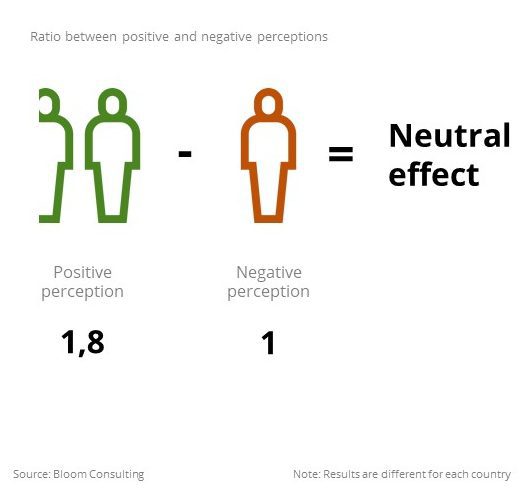
Thus, it was necessary to reformulate the analysis of the crisis to combine the ratio of perceptions with Brand-Nought. As the impact of Brand-Nought on the crisis will shift the axis by 1.8 units along the axis of the positive crisis ratio (X axis). According to the table below, South Korea recorded a crisis management ratio (20: 1) higher than B0 (0.9: 1), which results in a positive impact. On the other hand, the USA has a negative crisis ratio (1:10) and a high volume of mentions, needing 2.5 positive mentions to neutralise a negative mention.
In the specific case of China, the B0 of 2.9 is higher than the index of positive mentions which makes the results have a negative impact on the Country’s image despite having more positive than negative opinions.
The study revealed that the Countries with the worst performance received more attention than the Countries with better crisis management. This means that negative perceptions have a greater impact than positive ones. Thus, South Korea, Germany and Singapore were the Countries that reinforced their positive reputation thanks to good crisis management, while the USA, Italy and Spain had a greater negative impact on their brand, being considered as the worst managers of the pandemic. Furthermore, the US has a negative impact four times greater than the positive impact of South Korea.
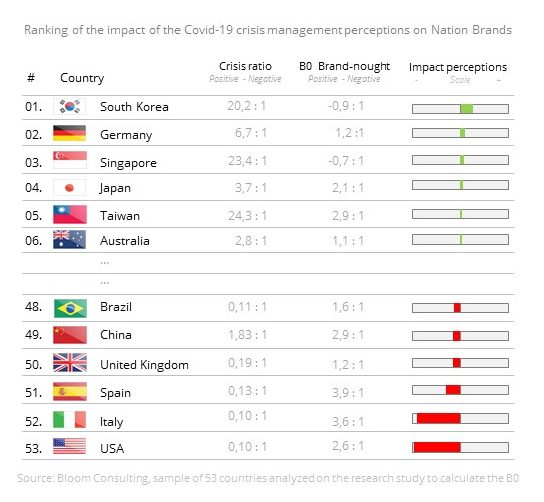
When crisis management perceptions are affecting a Country’s image, emotions will generate results or they will impact the dimensions of the Nation Brand, as stated in Bloom Consulting Nation Brand Wheel ©: Tourism, Investment, Talent, Exports and General Reputation.
However, Brand-Nought does not affect all dimensions of a Nation’s Brand in the same way. The study shows that the most “sensitive” or affected aspects are Study and Work (Talent). On the other hand, Visiting (Tourism) and Buying (Exports) are much more resistant to the Covid-19 crisis than the other dimensions.
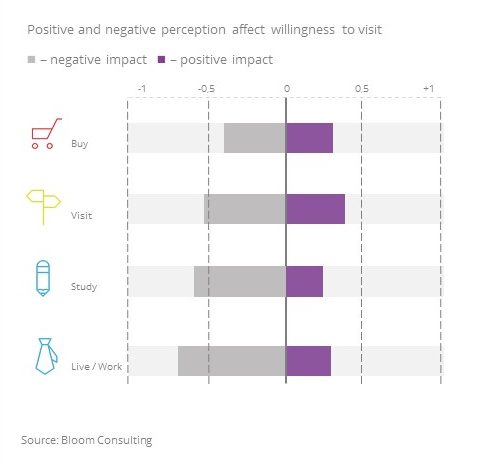
The key question is whether the new perceptions that arise during crises will migrate to the image of a Country or will disappear with the resolution of the crisis. As mentioned earlier, they are more likely to be diluted over time. However, Countries are losing time and transaction value. If the Identity and Culture of the Country are affected, the B0 will behave with an intensity 1.3 times greater than if it were affected only by Public Governance.
Takeaways to Nation Brands’ structures
As we know, the current crisis will not be short-term, and it will have devastating consequences on several sectors. Therefore, Nation Brands must prepare themselves as best as possible for the overall impact of the pandemic in order to guarantee a more solid and cautious structure in the event of a future crisis.
It is necessary to emphasise the importance of the Nation Brands strategy. Everything that is done as a Country, Region or City must be aligned with the answers given by its brand strategy. The Nation Brand strategy should provide answers about what the Central Idea is and how to act accordingly during these extremely difficult and challenging times. Countries, Regions or Cities that own and use a brand strategy prove to be more resilient.
The study into the impact of Covid-19 on Nation Brand perceptions leaves the following takeaways that all nations should retain and incorporate in their management:
1 – Calculate the Brand-Nought
B0 is necessary to understand, in a very direct way, how any type of crisis is affecting perceptions. Each Country, Region or City must be familiar with the B0 to monitor and assess the impact on the perception of their brand over time. The B0 is not only applicable to crises like Covid-19, but also to any Nation Brand activation project (i.e. campaigns, policies, events, projects …). It is used to assess all dimensions of the Bloom Consulting Brand Wheel © (Tourism, Investment, Export, Talent and Reputation).
2 – The Covid-19 crisis has a high B0
Although B0 changes from Country to Country and can be used as a reference among competitors, global B0 is equal to -1.8 which is very high and with a “toxic” proportion. No one is indifferent: 68% of global citizens have changed their perceptions of Countries based on Covid-19’s crisis management. All nations were affected, with more than 140 different Countries being mentioned in the research.
3 – All brand dimensions are negatively affected but with different levels of intensity
All Nation Brand’s dimensions are negatively affected by Covid-19. There is a correlation between the way the government manages the crisis and the transaction value, as well as the willingness to visit, live, study, do business and buy products. Talent (studying, living and working) is the most affected brand dimension, while tourism and buy from are the most resilient.
4 – It is important to understand the kind of perception that the crisis is affecting
Analysis of the types of perceptions allows us to better understand the crisis we are dealing with. A crisis of “Public Governance” (for example, Chilean protests) can have a different impact than a crisis of “Identity and Culture” (Brexit, for example) and a crisis of “History and Territory” (as with the forest fires in Australia). The perceptions generated by the different crises will definitely impact its ability to affect the image and the brand.
Published on 11.09.2020.











